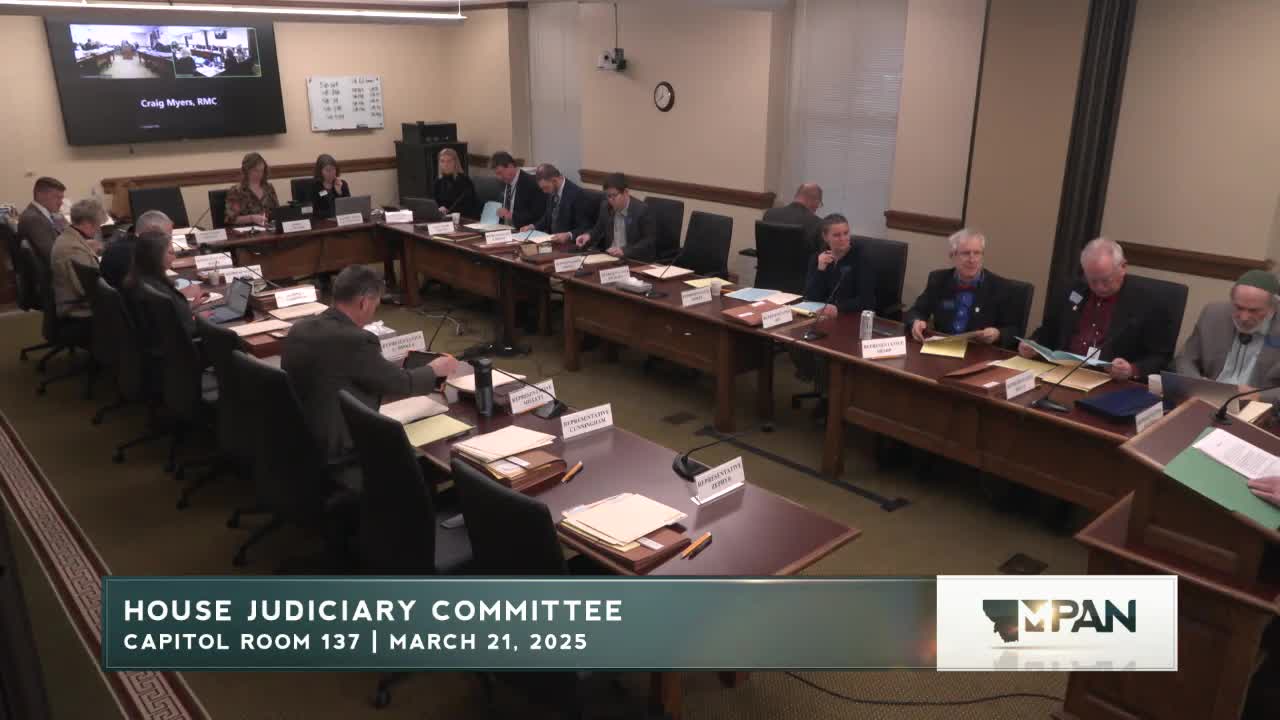Montana hearing on SB 164 draws hours of testimony on criminalizing gender‑affirming care for minors
Get AI-powered insights, summaries, and transcripts
Subscribe
Summary
A House Judiciary hearing on Senate Bill 164, which would amend the state endangerment statute to criminalize certain medical interventions for minors, drew hours of pro and con testimony from parents, medical providers, civil‑rights groups and self‑described detransitioners. No formal vote was recorded at the hearing.
Senator John Fuller, sponsor of Senate Bill 164, opened the House Judiciary hearing saying the bill would amend the statutory offense of endangering the welfare of children in 45‑5‑622, Montana Code Annotated, to prohibit providing certain medical treatments to minors and said the change was within the Legislature’s authority under Article V, Section 1 of the Montana Constitution.
Proponents testified the bill would protect children from irreversible medical interventions. Derek A. Streicher, chief legal counsel for the Montana Family Foundation, said the measure “recognizes the need for caution” and cited a February study as part of his argument that some interventions “are likely to lead to heightened psychological distress.” Jamie Reed, who identified herself as a former pediatric gender‑clinic employee and whistleblower, told the committee she saw cases she described as harms and urged lawmakers to create criminal penalties to stop what she called ongoing practices.
Opponents included physicians, medical societies, civil‑rights groups and many parents and young people. Kelsey Young of the Montana Coalition Against Domestic and Sexual Violence said the bill would criminalize parents seeking medical care for children and “is an affront” to those who work with children harmed by abuse. Khadija Davis of the ACLU of Montana said the bill “violates the rights to privacy, dignity, parental autonomy, and the right to seek health” protected by the Montana Constitution. Dr. Lauren Wilson, a practicing pediatrician testifying for the Montana chapter of the American Academy of Pediatrics, told the committee the bill’s wording is broad and risks sweeping in established medical treatment used for other conditions. “This bill would criminalize both parents and medical personnel,” Wilson said, and could deter clinicians from practicing in Montana.
Public testimony included multiple first‑person accounts. Several speakers described personal or family experiences of detransition and urged a private cause of action or criminal penalties for providers; others—many identifying as transgender, parents of transgender children, or health‑care professionals—urged rejection of the bill as harmful to patients and private medical decision‑making.
Committee members asked medical and child‑welfare witnesses about practical effects and about the bill’s language. Representatives expressed concerns about how the bill defines “altering the appearance” and whether common medical uses of the same medications (for example, treating precocious puberty or other endocrine conditions) would be swept in. Child and family services and medical witnesses said current statutory definitions and child‑welfare practice focus on acute neglect and harm (for example, fentanyl exposure) and voiced uncertainty about how the proposed language would be applied in practice.
No formal motion or committee vote is recorded in the transcript. The hearing record shows extended public testimony and multiple follow‑up questions from committee members but concludes with Senator Fuller thanking members for an “excellent hearing.”
The measure drew strong, organized opposition from medical societies, Planned Parenthood Advocates of Montana, the ACLU of Montana, and disability and domestic‑violence advocates; proponents included the Montana Family Foundation and several speakers who described themselves as detransitioners or as former clinic staffers. The hearing transcript records extensive back‑and‑forth about medical evidence, statutory drafting, and the potential chilling effect on clinicians; committee members asked for clarifications about intersex protections and prosecutorial discretion.
The committee did not record a final action on SB 164 in the transcript provided; further committee work or amendment is likely given the range of concerns raised and the number of technical drafting questions members asked about scope and exemptions.
